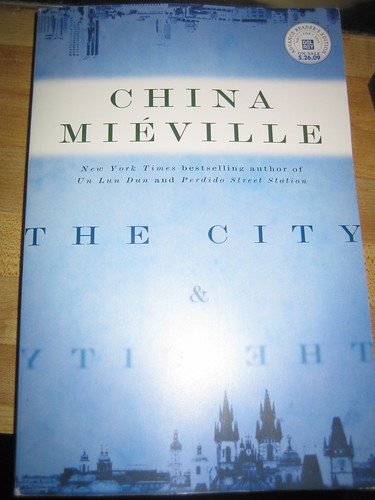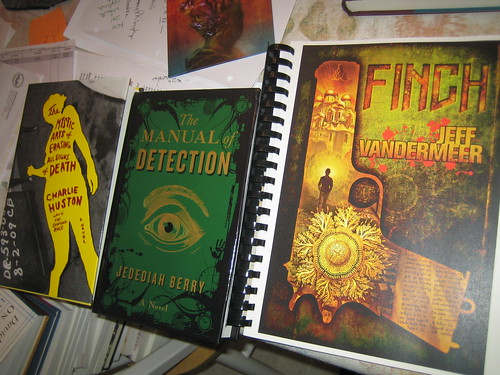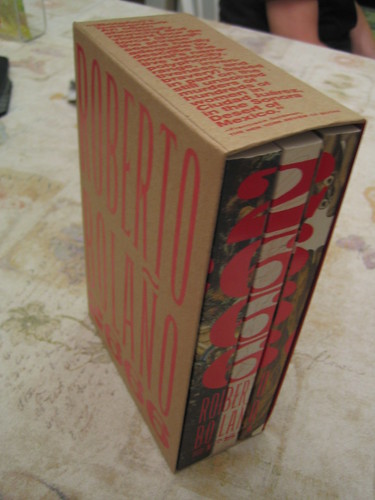Surreal Noir: Something Stirring, Redux
Following up on my prior post, I’m definitely looking forward to this one, which arrived today, perhaps more than any other Mieville novel. It looks to be influenced by Borges, Kafka, and Kubin. I’ll be interested to see how the literalization of the figurative–Borges generally works because he doesn’t have traditional scenes in his fiction—is achieved here. If he pulls it off it could be magnificent. I’m just speculating here, but getting to Borges through Kubin might be the key, because Kubin did a nifty job of creepy surrealism and Borgesian-type play in the context of a more conventional story. Add in the structure of a police procedural and you’ve got the recipe for something that updates all of these approaches.
I’m also happy to see that Mieville’s novel and mine are vastly different creatures. It means I probably didn’t need to toss the advance unbound copy I got a few months ago (when you’re in the act of creating something idiosyncratic and retooling your style in the process you don’t want any white noise or interference from another highly visual imagination).
I’m definitely going to tackle a long critical essay, from a writer’s point of view, on this latest wave of surreal, fantastical noir. It’ll be interesting to mix analysis of books like the ones below with my own perspective from inhabiting the interior of Finch for so long–and from eight years of reviewing nothing but mystery/noir novels for Publishers Weekly.
(Interesting review of this one here.)
And I think I’ll have to talk about elements of this one in that context:







12 comments on “Surreal Noir: Something Stirring, Redux”
I’m very eager to read that essay when you write it, but if I may suggest an additional book for that list, I’d recommend Bolaño’s The Savage Detectives as well, as there are hints of the events of 2666 in it, plus it approaches the detective/mystery elements from a different angle (plus it has elements of Borges in there as well).
Yeah–but I didn’t like Savage Detectives very much. :(
jeff
It’s been a few years since I’ve last read it, so what was it that you didn’t like? How the narratives were structured? How Belano seemed to disappear from the narrative too much, even for a novel like it? I’m planning on re-reading it after I re-read a few more of Bolaño’s works, so I’m just curious about what didn’t work for you.
I am also very excited about China’s new book. Only Gaiman is better but China is revolutionary. People do get over hung up on genre et al when discussing him but really he just writes great unorthodox plot lines with perfectly visualized scenes. A friend of mine did not like Perdido but said he could see the city as well as any place he had ever been in his life.
You had an advance copy of the Mieville and you tossed it? Tut, tut. I’m not writing an urban noir fantasy that might get contaminated by it, so I’d have been happy to read it.
It occurs to me only now that one of the reasons I like Bolaño so much is how urban his stuff is. Savage Detectives is almost Ulysses-like in its itineraries, and Santa Teresa in 2666 is definitely a character in its own right. And not out of place in dark fantasy, either. That’s a take on the novel I haven’t seen before. Has anyone in genre reviewed it at all, in fact?
I smell a thesis–Darkness Visible: Pandemonium, Viriconium, Ambergris, New Crobuzon and Santa Teresa, or Places You Don’t Want to Visit When the Sun Goes Down.
I’m definitely loving this new fantasy-noir trend. It combines my two favourite genres, for one. And funnily enough, part of my thesis argument was about how the city has come to the forefront of contemporary fantasy and replaced the Tolkienesque rural ideal. I cited New Crobuzon, Ambergris, Ashamoil (Bishop) and the Castle (Swainston) as examples, and used Gormenghast and Viriconium as precedents for the city in fantasy literature.
I came across Mieville’s new one a few weeks ago on Amazon and I’m lovin’ what I’m hearing so far.
I have much love for Fantasy Noir. It’s interesting to watch it’s rise. Since Perdido (though the movement was long brewing, as your own work and anthologies show) the realization of fantasy’s cliches seems to have finally hit home, and it’s interesting to watch works move away from the Tolkein-esque mode. Sword and Sorcery brutality, and some simple viscerality have snuck into Epic Fantasy, and in other strands of Fantasy–similarly (in some ways) to the work of Gibson et al. (which I think marks the point where science fiction became massively aware of its own cliches)–noir is becoming incorporated. Part of me wonders if noir is just the genre of the cynical, and there’s definitely something reactionary too it, especially when compared to the Tolkein tropes. Noir seems the antithesis of high-falutin kings and queens. It is a very personal genre compared to the broad sweep of traditional fantasy… So I think maybe it draws writers trying to break the traditional mold. But also there is something perhaps that still resonates. It is an urban genre, and that is the direction both society and fantasy seem to be moving in. With the destruction of most of our grand narratives, the smaller stories and smaller victories of noir are easier to grasp…
These are all random thoughts, and I suspect they’ll fall apart if I push them too hard, so I’m going to stop here.
It’s a great topic — and one that runs deeper then one might expect. As a lifelong fan and reader of mystery/crime fiction I’ve long since been interested in the books and authors that seem to run off of a different paradigm. The books that further expand what a crime story can be, that push and pull at the line of demarcation.
What I’d be curious to explore is what is the appeal of crime fiction forms for fantasy writers. Jeffrey Ford has moved in this direction over the years (even winning The Edgar); your own Finch and Mievielle’s The City & The City.
Some others from the last few years that may be of interest and deserve a wider reading audience are The Boy Detective Fails by Joe Meno, The Insult by Rupert Thomson and Los Angeles by Peter Moore Smith
And, as an after thought, as much as I love the new Huston I’m not too sure how he fits in with this grouping of books.
I’ve been thinking about writing a series of columns that showcase some of the books that mystery/crime fictions readers (and the community) seem to be unaware of or unwilling to include into the fold.
James,
I’m planning on writing an article on Bolaño’s books in a few months when I have a week straight to devote to translation and citation (I read him only in Spanish), but I believe Matt Cheney has blogged about him before. I suspect, as in the case of Carlos Ruiz Zafón, that it’ll take a few years for the genre-friendly qualities of Bolaño’s writing to become well-known in various genre circles. Helps that Bolaño has quite a few references to SF in his other writings and poetry.
james, I haven’t read the huston yet. I assumed it had a supernatural element from something I was told.
the appeal of the detective structure for me is that it’s yet another way of both avoiding the hackneyed quest structure and also subverting that structure because a detective does go on a kind of quest.
for my part too not just using the tropes of detective fiction but my version of its use of language–abrupt, brusque, snappy–allowed me to bring the reader down to street level. city of saints is often about the idea of a city used to riff on other subjects. Shriek was an immersive view of the city but through the distancing prism of an offbeat viewpoint. in finch you are right there with the main character at street level feeling the grit and temperature in real time with no filter, so to speak.
Jeff, thank you for mentioning Kubin… I’d never heard of him before and that just took me on a ten-minute excursion looking at some of his art on the web, and I’ve just added ‘The Other Side’ to my wish list. Cheers!
Looking forward to the Mieville…
Good to see, that Kubin is going around here. His »The Other Side« is maybe the best german tale of the fantastic from the last century.
@Jeff: An review from you about Kubins novel would be great. »The Other Side« was published 1909! So the 100th anniversary would be a good opportunity.
Comments are closed.